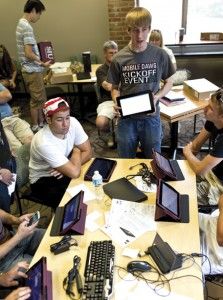Tablets offer cheaper alternative for freshmen

September 3, 2013
The university’s new tablet initiative evokes diverse opinions among students, and new issues to be examined.
A Dell Latitude 10 Tablet has been given to the entire freshmen class this semester for the first time. Kelly Cummins, IT director and UCOL 101 instructor said the university leases the tablets to freshmen for four years and when they graduate, they can keep their tablets.
Advertisement
Many freshmen say they have varying opinions on the new initiative, but most appreciate the money saved on textbooks.
Destiny Henry, a freshman from Union City, Tenn., studying criminal justice said she enjoys carrying the tablet rather than several textbooks.
“I really like it because of it’s convenience,” Henry said. “I had the opportunity to buy a laptop, but decided against because I knew I was getting this tablet.”
Cummins said studies have shown that using an e-book is cheaper than using print. Last year, he said using the platforms Courseload and CourseSmart, the average price of a textbook was $30. Using the Pearson platform this semester for UCOL 101, he said the price was slightly more expensive, but the e-book fees were included in the course fees.
Jack Richmond, a freshman from Springfield studying computer science, said because of the tablet, he spent less on textbooks than he thought he would.
“The tablets are cost effective, I spent less than $300 on textbooks,” Richmond said.
Richmond said his one complaint was he wished different types of tablets other than the Dell were available for freshmen.
Advertisement*
Cummins said the possibility of having different tablets through Apple would be a consideration for some students who would deal with that platform more through their major.
While students have complained of complications with tablet usage, Cummins said after the trial they did in the spring semester, they were able to find and fix many of the issues. This year, IT reserve money funded the tablets, he said.
“This semester, the main items that I’m hearing about and see come through the tech center actually have to do with simple connectivity issues, which is probably the main thing,” Cummins said.
Cummins said the connectivity issues are largely prominent in the residence halls, and they are largely Windows 8 problems, not tablet problems.
“We’re working on improving the wireless coverage in the residence halls,” he said.
Jibria Westbrooks, a freshman from Chicago studying art, said she thinks the larger issue might reside with the university’s connection and Internet speed.
“I hate it, it never works,” she said.
Westbrook said she has had issues with her tablet freezing, connecting to the Wi-Fi on campus and opening programs.
Despite technical problems, many students feel the tablets will be beneficial to their learning experience.
Karli McIntyre, a freshman from St. Louis studying accounting, said the tablets are able to do more than a textbook can.
“It’s versatile,” McIntyre said. ” I haven’t heard of any other school that is doing this, so I think it’s a cool initiative the school is doing.”
Cummins said he thinks overall, if teachers use tablets in an interactive way and use all the additional tools that tablets explicitly provide, he sees this initiative as something being successful and well liked.
“We’re one of the first research institutions to have this wide-scale tablet project like this,” Cummins said. “Our long term plans are to keep doing this and find a funding model that will support this in the long run and we are working on narrowing that down.”
Karla Berry, director of the Center for Teaching Excellence and UCOL 101 instructor, said University College 101, Math 101, and English 101 are all courses that the tablet will be interactively used among students through the Pearson platform so that students will only have to log in once to access the other classes.
“I’m a big technology person, so I like the e-text and think it’s a much more viable option,” Berry said.
She said buying the e-books could save students up to half the amount they would otherwise save on textbooks. She said it largely depends on the individual textbook and whether or not the textbook is an e-text.
“They’re not just getting the content when they get the e-text, they are getting interactive abilities,” Berry said. “I like using it as an instructor because I can base my teaching off of data I see on the tablet.”
Berry said she can see exactly what her students don’t understand through homework and quiz data on the tablet and she can address it during class time.
Cummins agreed with the abilities the e-book possesses. He said instructors are able to make notes within the text that all students will be able to see in some platforms.
While faculty members may find the tablets helpful for instruction, several students are on the fence about how effective they can be.
“I rather we have something with a keyboard,” Andrew Cirillo, an undecided freshman from Chicago said.
Cirillo said he prefers a laptop format rather than the small screen of a tablet.
Incoming freshmen are not the only students who qualify for the tablets. Transfer students with fewer than 26 hours will be eligible to receive tablets, he said. Cummins said he doesn’t foresee many students with no tablets being in the classes with tablets.
“We are looking for possible options for students to lease a tablet to provide a broader range of options,” he said.
Cummins said he thinks the lease would be around $75 a semester. To buy the tablet with a full accidental damage warrantee would be in between $600 to $700, he said.
Advertisement







